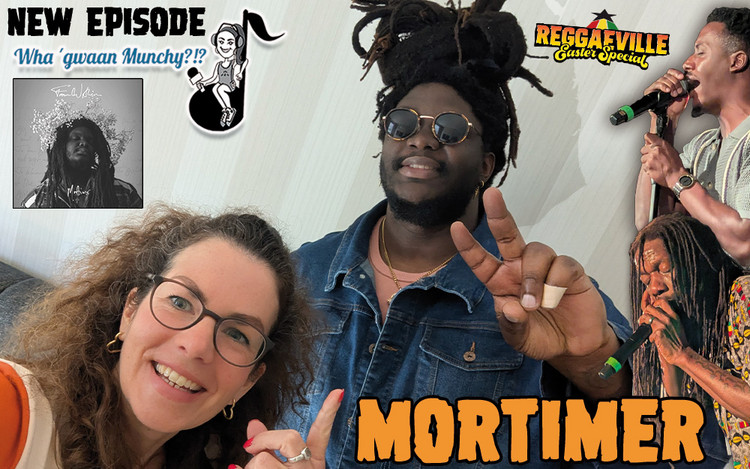Mutabaruka ADD
Black Attack! The Mutabaruka Interview
10/10/2023 by Steve Topple
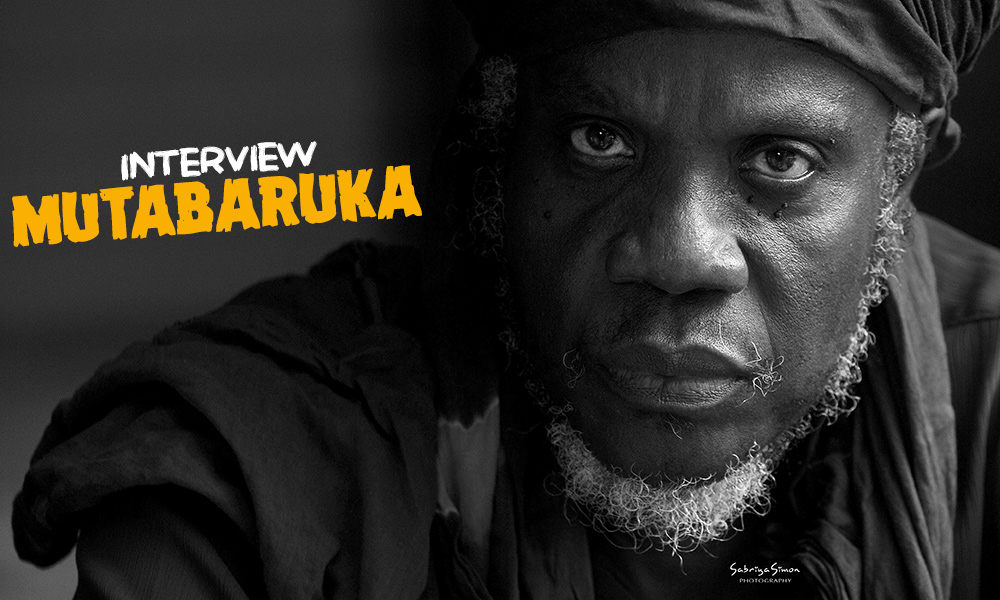
Perhaps the most formidable force in Dub Poetry, Mutabaruka has never been one to tread an easy path when it comes to his art. Often contentious but always true to his beliefs, his work has brought worldwide academic and critical acclaim.
Now, after a 14-year international hiatus, Mutabaruka has returned with a new recording – working with UK-based producer Mad Professor. The record is called Black Attack (out on Shanachie Records) and is a seminal work for the artist – showcasing his brilliance with words, and ability to communicate messages both effectively and inventively.
However, why has it been so long since he released a record to a worldwide audience? What drives him even after 32 years in the business? And what does he think of Trap Dancehall, and the rise of social media in terms of Jamaican music? Reggaeville caught up with Mutabaruka to discuss all this and more.
GREETINGS MUTABARUKA! THANKS SO MUCH FOR SPEAKING WITH REGGAEVILLE!
Give thanks!
BLACK ATTACK IS YOUR FIRST ALBUM IN 14 YEARS. WHY WAS THERE THIS BREAK FROM RELEASING WORKS?
I didn’t have a break, you know? I had two albums that were released in South Africa. It was with a company called Revolver, a big record company, and we did two albums – Life And Lessons, and Mutabaruka In Combination. But they didn’t reach the West. Since we’ve been doing music over here, it does reach Africa.
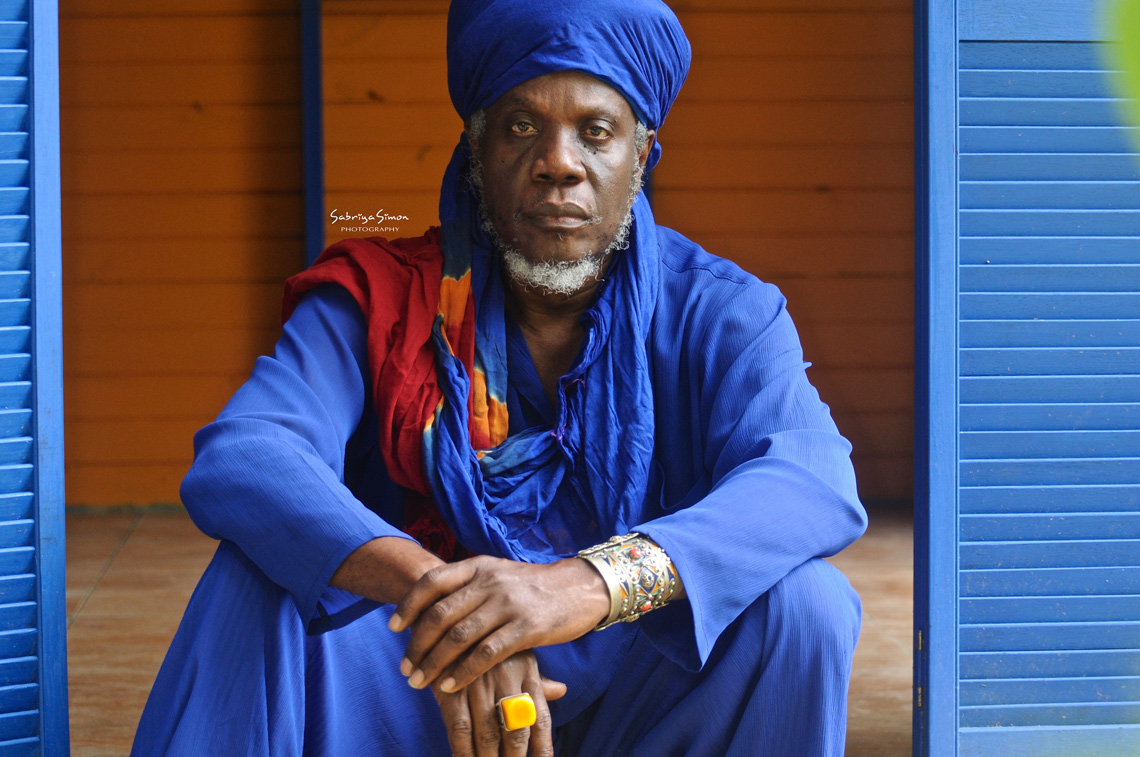
WAS THAT INTENTIONAL THAT THEY DIDN’T REACH THE WEST?
I didn’t have no interest in getting a company to release it. I’ve been to South Africa so many times, doing so many things. And since Revolver said they wanted to release an album – they had previously released a video of my early Sunsplash show in '93 – so I said alright, let’s give them what they want in Africa!
[LAUGHS] I WAS JUST CHECKING YOU HADN’T BEEN CENSORED!
[Laughs] No, no…!
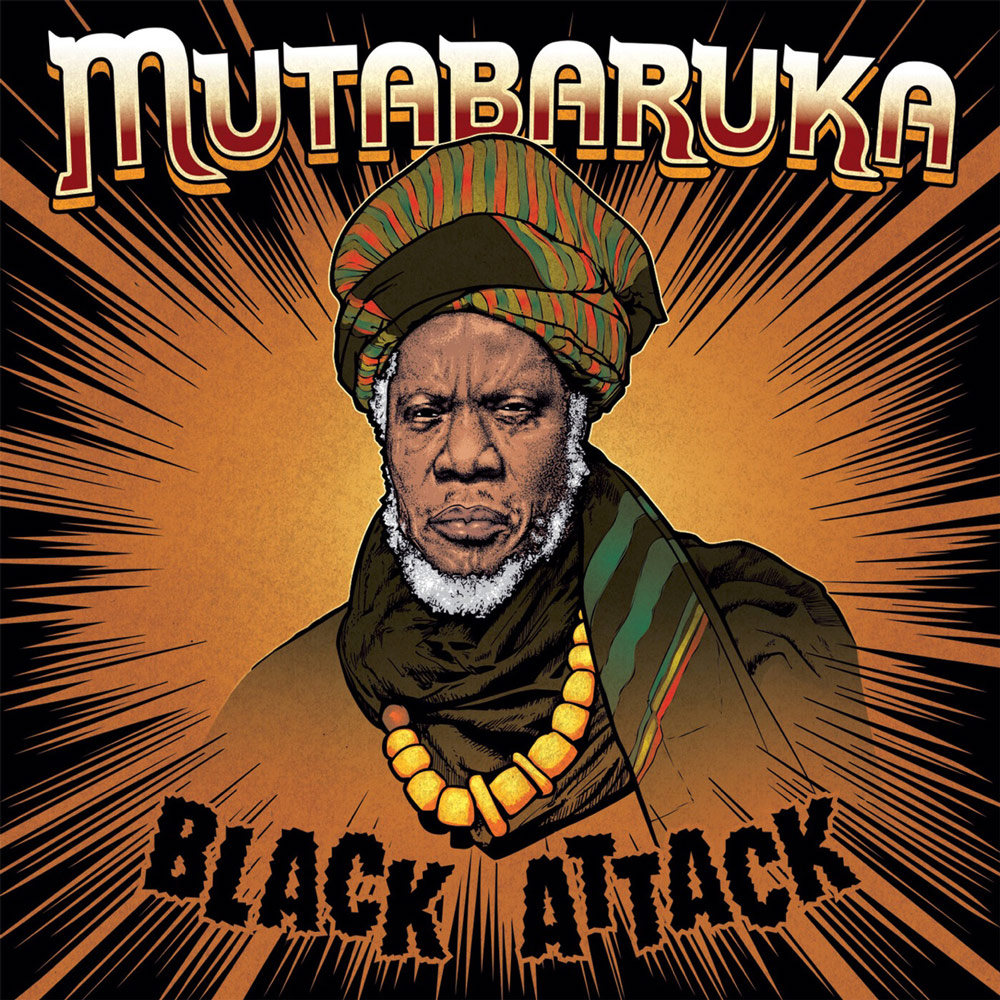
SO, HOW DID THE NEW ALBUM COME ABOUT?
Black Attack came about when Mad Professor gave me some riddims, and he said he was coming to Jamacia. I listened to them, and when he was going to come to Jamaica, we were going to record them – but he never came. That was about seven years ago. So, I went to England last year, and I called him. I went to his studio and listened to some riddims he had and took my poetry book too. I took some of the poems out of the book that weren’t recorded over the years, plus I wrote some on the spot listening to the riddims. So, we recorded them and that was the album, Black Attack.
HOW DOES THE CREATIVE PROCESS OF WRITING POETRY WORK FOR YOU? IF YOU WROTE SOME ON THE SPOT, SURELY IT MUST BE ORGANIC?
So, a track like Everything Black was in my book. But then Black Attack and Scratching Scratch Back were written on the spot. That track, Mad Professor used to work with Lee, and he was also a very good friend of mine. So, when I was in the studio this came to me, so I wrote the track in a kind of obscure way – if you listen to what I’m saying in it, and you’re familiar with Lee’s work, you’ll know a lot of what I say is taken from his music… all of it relates to Scratch.
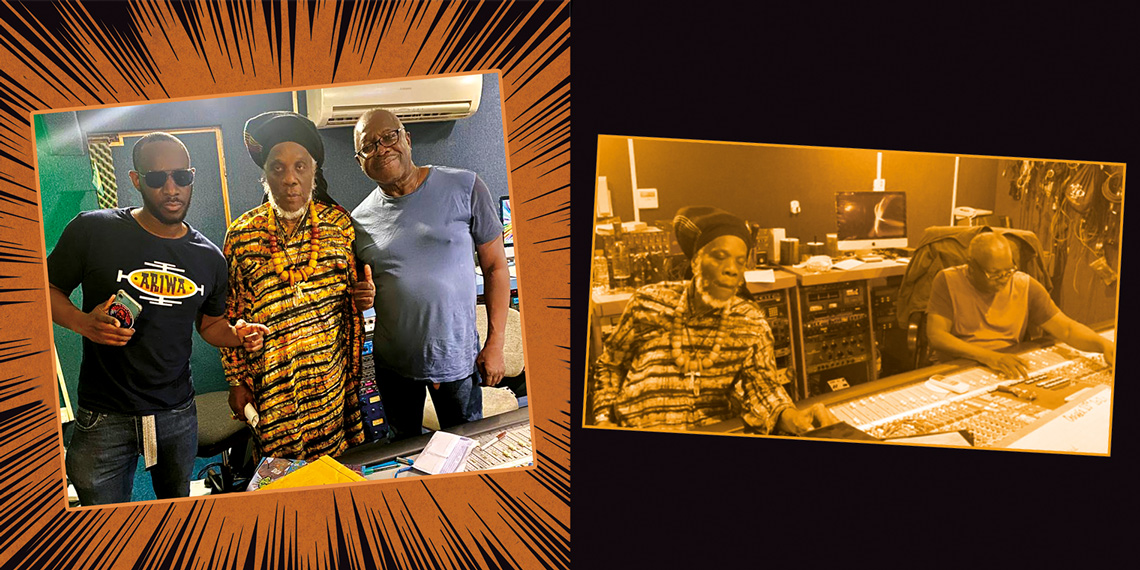
[LAUGHS] IT’S A BRILLIANT TRACK, AND I CAN’T BELIEVE YOU WROTE THAT ON THE SPOT – BECAUSE IT’S NOT A TRIBUTE TRACK IS IT?
No, it’s not – I was just trying to ‘scratch, scratch back’… [laughs].
[LAUGHS] I’M REALLY SURPRISED YOU WROTE BLACK ATTACK ON THE SPOT TOO – BECAUSE IT’S A GENIUS BIT OF WORK. YOU’RE TAKING INDIVIDUAL WORDS AND THEN CONSTRUCT A LONGER SENTENCE OUT OF THEM – RELFECTING ON 500-PLUS YEARS OF COLONIALISM. HOW DID YOU WRITE THAT ON THE SPOT?
Well, it’s about remembering the different headlines and news reports, it’s about remembering history, and it’s about remembering what’s been done to the African people. So, it’s a collage of different headlines - like a headline poem. It doesn’t go deep into what is said, but it’s the things that are confronting us in this time. A lot of the things that you hear me say, it’s about things like the police – blue attacking black. All the things confronting us. I put them together. Mad Professor says it’s his favourite.
THE CONSTRUCTION IS BRILLIANT, IT REALLY GRABS YOUR ATTENTION. I SEE WHY IT’S HIS FAVOURITE – IT’S GENIUS.
Give thanks!
THE TRACK ALSO SUMS UP YOUR APPROACH TO YOUR WORK AND POETRY GENERALLY. YOU’RE NO LESS HARD HITTING – ON CUTTING EDGE YOU TALK ABOUT ‘LONG WI TEACH, LONG WE PREACH’. YOU’VE BEEN DOING THIS FOR 32 YEARS – HOW DO YOU MAINTAIN THIS RIGHTEOUS INDIGNATION?
Well, it’s our life, y’know? When we see certain things that confront us, we must speak out. To speak out, I have the forum – the radio – and a microphone in front of me every week. So, I don’t want to just go on the radio and say ‘get down, go up, go round’ – I confront situations. Politics, religion – any subject that I deem unfit for the people to absorb. We’ve been absorbing so much crap over the years, by the [old and] new colonialists – America, Russia, England, all these places – so I feel we must use our artwork to help, to give a certain clarity in the minds of the people that they can then think. Because we’ve not been thinking critical over the years, we just take anything they come with.
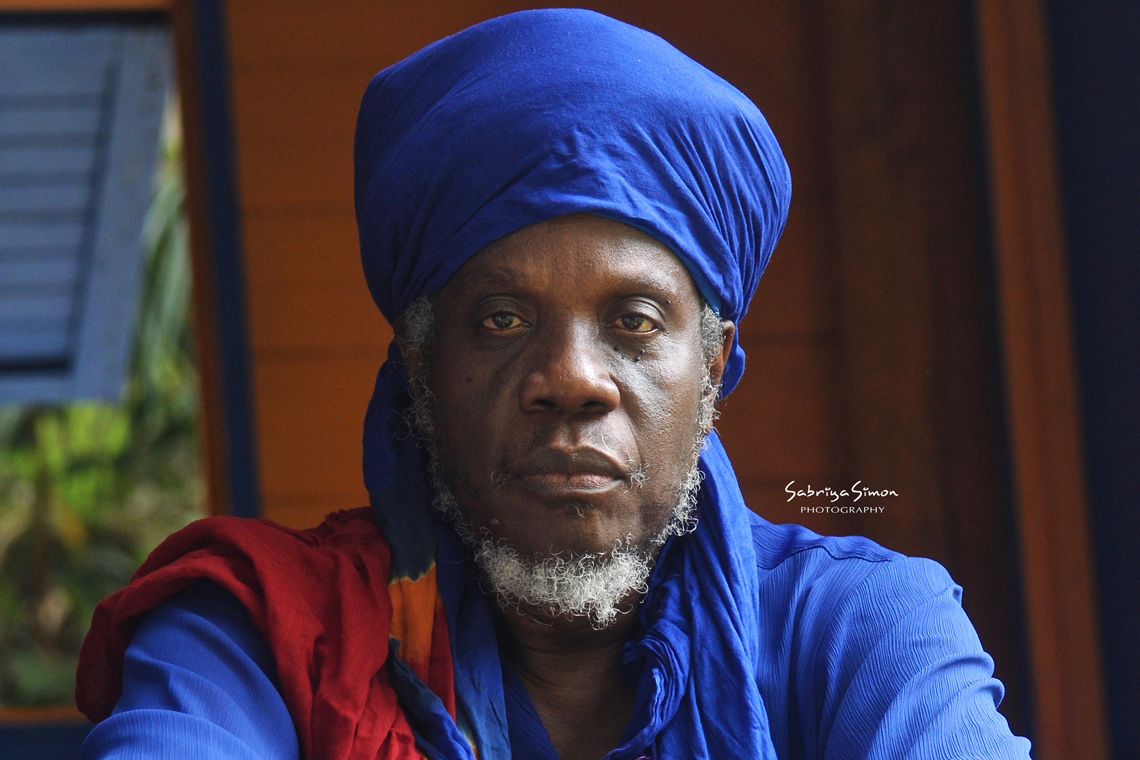
But now, we realise with the radio and YouTube – we have to use these things. We have no guns and bombs like them, but we’re verbal swordsmen – and we use that verbal clarity to make the people try and understand it on another level. We don’t have to use European logic to define ourselves – there’s Chinese, Indian, African. Who’s to say everything Europeans do in their logical and cultural environment is good for the people in Africa, in China?
NONE OF IT’S GOOD.
Exactly.
YOU SAY ABOUT CRITIQUING THE WORLD AROUND US. DO YOU THINK HUMAN’S ABILITY TO CRITIQUE HAS GOT WORSE?
You see, people think when you talk this way like I do, you’re trying to save the world. The thing is not to save the world, it’s individuals you’re talking to, and any individual you can connect with is a win for the battle, for the war. So, I don’t think I can save the world, but there’s individuals out there that listen to me and save themselves. I’m not in a Jesus concept where I’ve come to save the world. But if you can get one person to listen, and the next week get another person to listen, and then the next person, then you will have accomplished something, because that person will reevaluate their situation, and go out there and say it to one person and then a next person - and it keeps going.
When I started out and the youth were listening to me, people would say ‘that Rastaman a madman!’ But them same youths that were listening to the programme are now big people in universities abroad, and when they go to these universities, they hear the professor with same reasoning that the Rastaman was using on the radio. They invite me to the universities. And when I leave Jamaica, these are the same youths that were listening to the Cutting Edge, saying we need Mutabaruka to come and talk – I remember going to Yale to talk… I keep doing it because thousands of people around the world are listening… and right now we see it happen.
The professor who did a thing on me in Ghana, his students did a thesis on the Cutting Edge show, interviewed people, sat in the studio with me – then, when they’d done this the university called saying they’d like to do a book on the show. I said yes, as long as I could read the book. So, me and my wife sat down and went through it – and now it’s a book, Mutabaruka: The Verbal Swordsman.
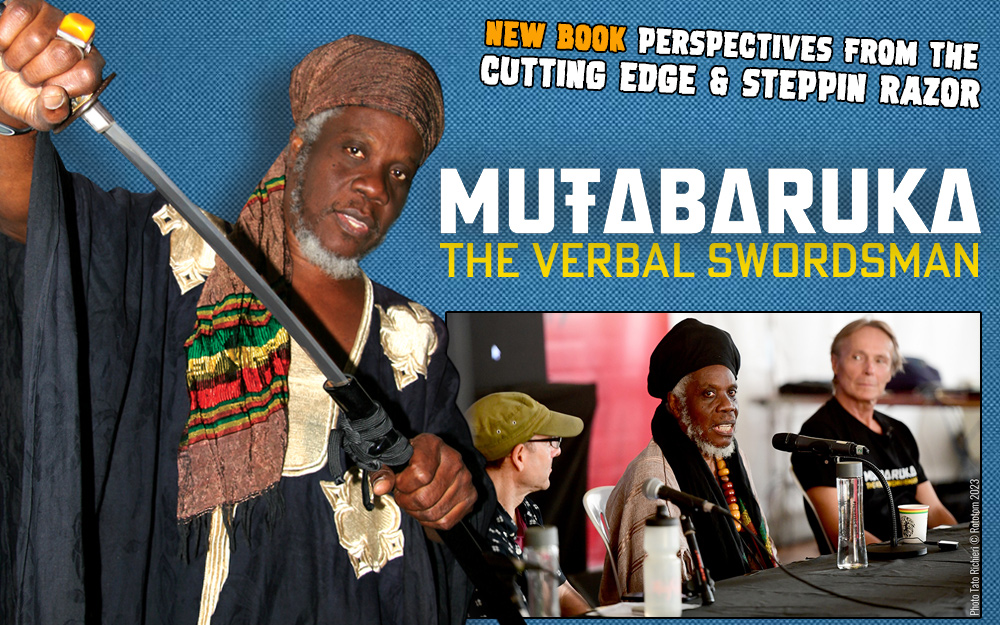
YES! I KNOW SEBASTIAN, WHO PUT THE BOOK TOGETHER!
Yes, he’s the main one. So, when I look at the book, about what the show has accomplished – I’ve never seen a Jamaican radio show accomplish that. Plus, people love that I don’t stick to the music that’s popular. I try to wake up the people with different music from different parts of the world: Dancehall, Reggae, but also African music. When was playing the music from Fela [Kuti] nobody was knowing about Afrobeat – now, it doesn’t sound strange to them, it’s more palatable to them now. But then, it came like something strange!
So, it may look like nothing is changing, but something has changed. Some people are looking for the whole world to change, like Jesus coming. But I don’t believe in that.
YOU MENTIONED DANCEHALL. I’VE BEEN WATCHING YOUR VIDEOS, AND YOU HAVE SOME STRONG FEELINGS ON TRAP DANCEHALL. WHY DO YOU THINK THE YOUTHS ARE DOING THIS KIND OF MUSIC?
The intensity of the American culture is devastating. We’re so near to America, everyone has an American visa, the iPhone is the new God. When we were coming up, we didn’t have iPhone to search all the decadence, the craziness that’s going on – but now, the youth get close to that. Because it’s so intense, they internalise it and carry it to their communities. Plus, the economic and political situation in Jamaica is not very nice.
So, put that together and you get families that are disconnected. When you have children having children, the children don’t know how to bring up the children. There’s no handbook. But what is near is the American culture, and that’s’ what they gravitate towards. They listen to Trap music and try to copy it – and the lyrics are what they identify with.
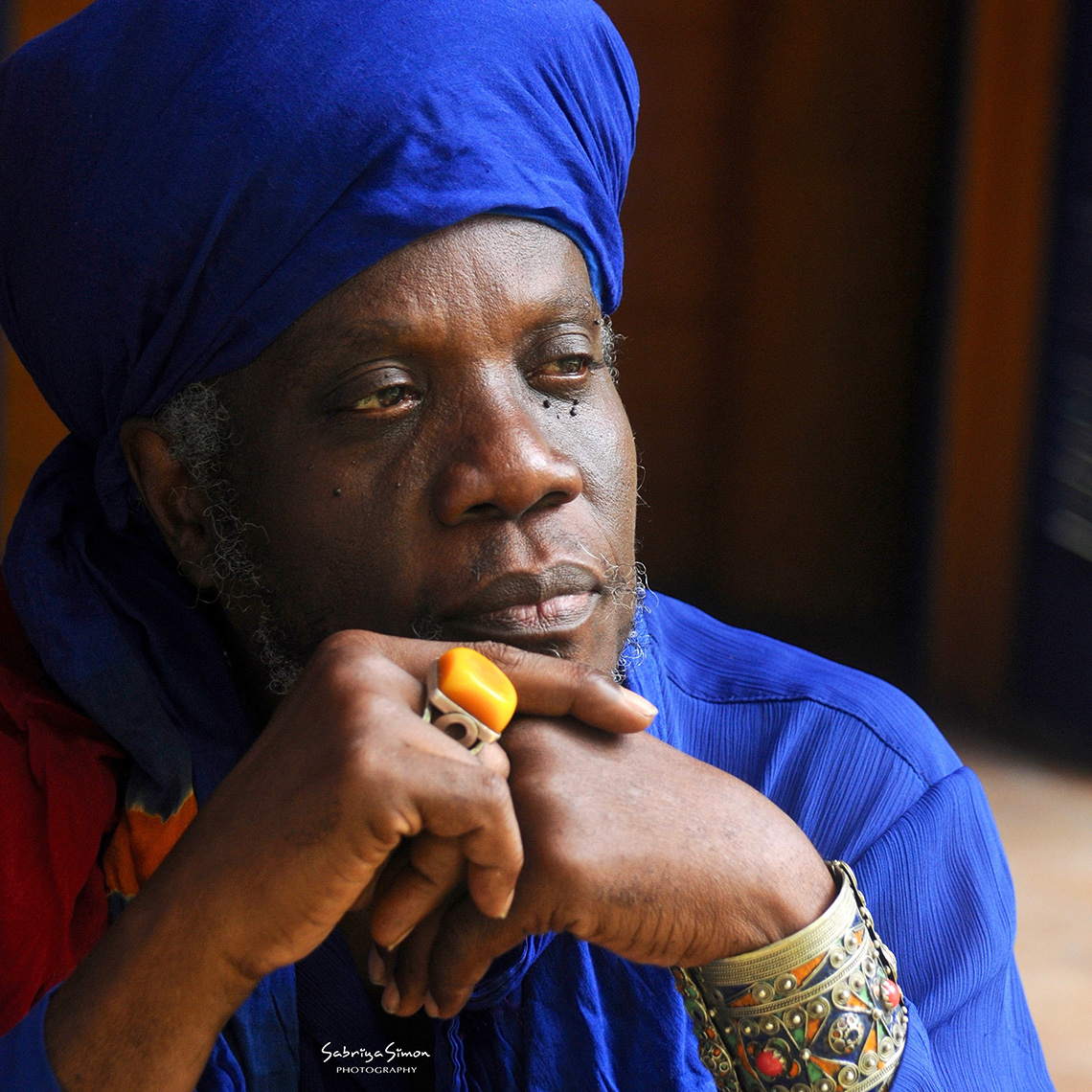
It's a problem, but Jamaican music started with Mento, and went to Ska, then went to Rocksteady, then Reggae, then Dancehall music – and Dancehall music is now taking turns. Every music genre takes turns. There was a time in America where Jazz was Pop Music. Acid Rock was a thing – now it’s Beyoncé, Rhianna. Things don’t remain the same – everything just change.
OF COURSE, ON FESTIVAL LINE UPS IT’S GENERALLY STILL ALL THE OLDER ARTISTS AND REGGAE ARTISTS.
These artists are the ones people grew up with – and those youths are the people now doing these festivals. It’s infused their mind, so that’s what they call for. They can’t understand the music that’s coming out now. I don’t know if when they grow up, the youths will be listening to… [what they do] now – but I don’t think so, because the children are listening to the music their parents listen to. In Europe, the adults now keeping the festivals grew up with Bob Marley, Burning Spear – he’s travelling most of the festivals still; they still respond to him. These are the children that grew up with him. And they’re inviting their children to listen to him – that’s why festivals are so crowded with young people, who appreciate the music their parents listen to. I used to listen to the music my parents listened to, and I brought up my children to listen to the music – and guess what, my children’s children don’t want to listen to the music that other youths listen to.
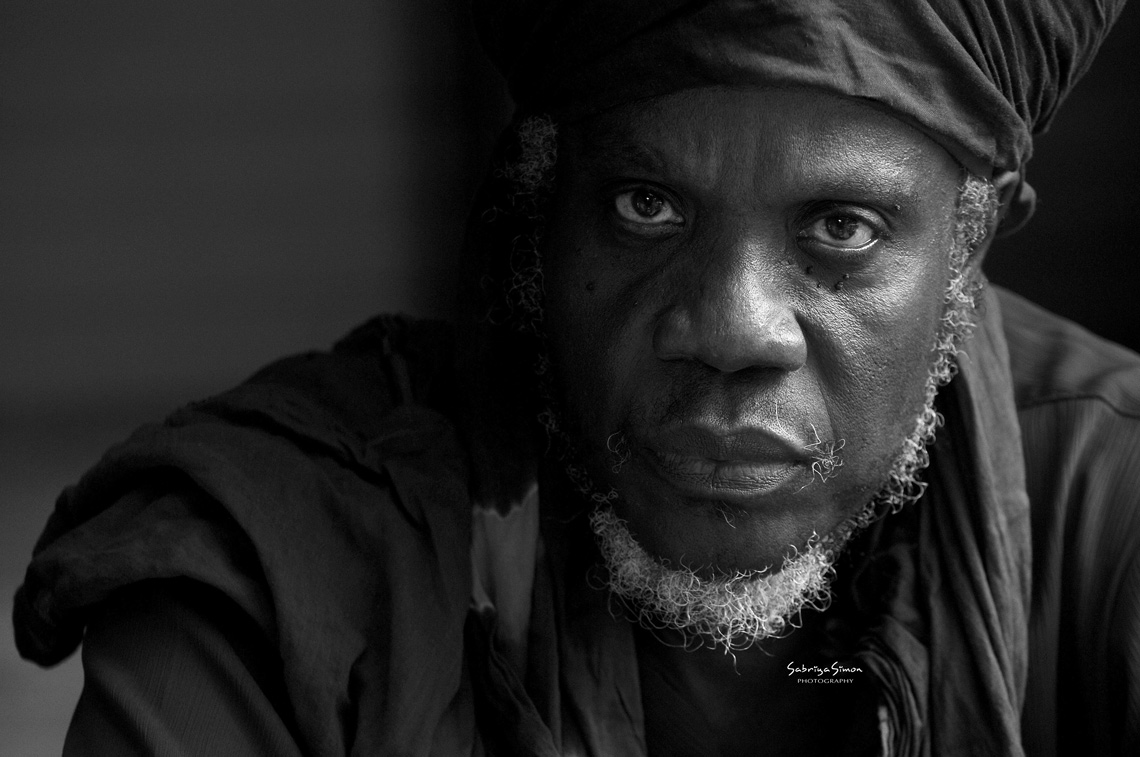
WHY?
They’re not interested… we’ve brought them up differently, a mother, a father, I used to take them to school – we live as a family. We live a Rasta life in the country. So now, they brought up their children that way too. So, there’s a way parents can work out that thing. But the family structure has gotten broken down in Jamaican society because of the Americanisation of the culture.
YOU’RE ONE OF THE LAST DUB POETS…
I don’t know about that…!
WELL, YOU’RE AGENT SAYS YOU ARE [LAUGHS]. ARE THERE ANY OTHER STAND-OUT DUB POETS STILL WORKING?
[Laughs] OK, so what I have to say is Dub Poetry has never been seen like Reggae has. It appears on the back burner. When people talk about the Jamaican culture, they don’t talk about Dub Poetry. Me and Linton Johnson went out there and pushed the genre, and it became popular because of me, and Linton, and Oku Onoura. Now, you have a lot of youths in Jamaica doing poetry. When I started, I did one track, one poem, and it went on the pop charts in Jamaica and that solidified me as a Reggae artist. Then I started to tour, and I was filling up places, touring America – while Linton was touring Europe.
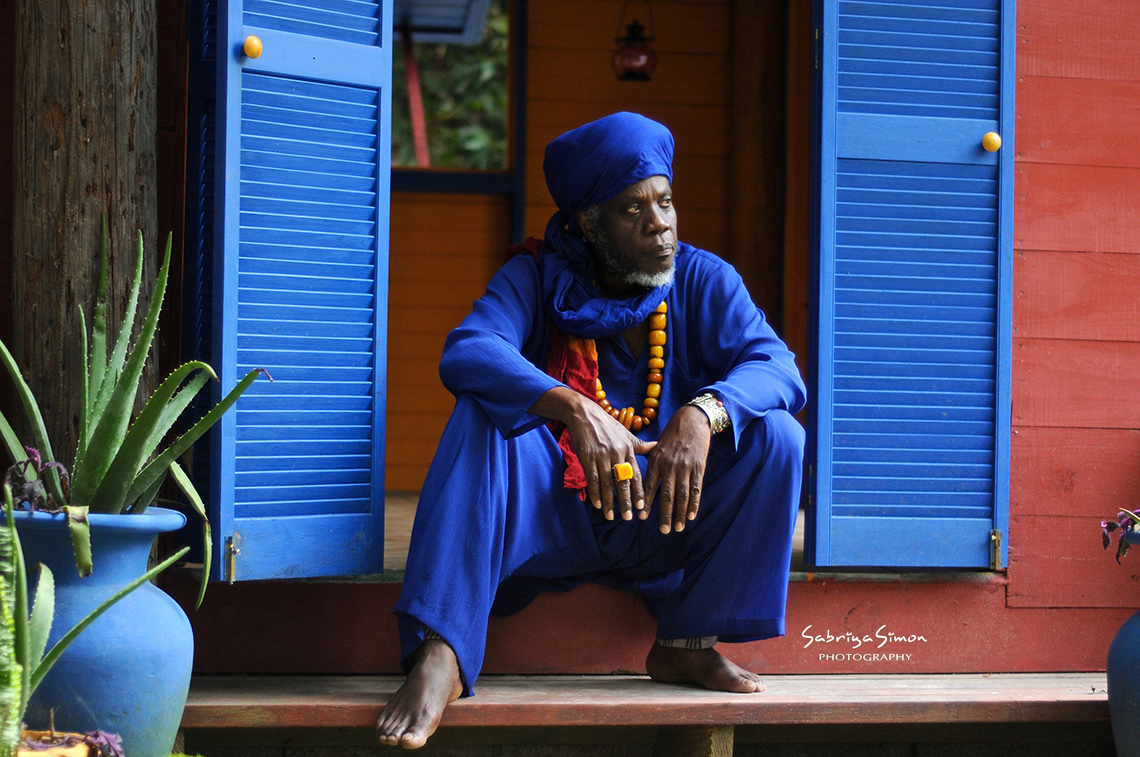
So, right now you have poets in Jamaica, but they need that one poem that will propel them. I remember I did an album, and I paid a lot of money to do the album. I did one poem on it without music – and it’s that what propelled me to another level. It was Dis Poem. It’s one of my most popular poems – it’s been sampled and re-recorded more than any other. These poets now need that one poem to propel them.
IS IT POSSIBLE NOW? BECAUSE WHEN YOU STARTED, THE LANDSCAPE WAS DIFFERENT. WE’RE SATURATED WITH MUSIC AND ART NOW. ALGORITHMS CONTROL IT. CAN YOUNG POETS MAKE IT?
It’s harder, but I look at it like, there are artists in the world right now who made that one song and they’re living off it. Nina Simone – My Baby Don’t Care For Me. 20 years after she made it, it went to number one in England. The Everly Brothers did the same. So, they need one track to break the barrier and then the others will come. Given that we have Spotify, iTunes, the internet – to me, I think it’s easier than when I started out – they just need that one poem. I know it’s easier – everybody’s on the internet, using iPhones. I tell them – I used to get this award, I was getting it for years, but I told the promoter not to give it to me. I retired myself and they renamed it the Mutabaruka Dub Poet Award [at the International Reggae and World Music Awards]. Cherry Natural got it, Ras Takura got it. You have so many – Benjamin Zephaniah in England has done a lot of work also.
So, it might not look easier – but it is easier now. We hope that this album, Black Attack, will regenerate and reignite interest – since I am of an age now, and doing this, and I’m hoping I’ll get a nice response to this.
JUST TO FINISH, ARE YOU TAKING BLACK ATTACK LIVE? IS THERE A TOUR IN THE WORKS?
Since we did Rototom Sunsplash, and people realise the album is with Mad Professor – he has his own crowd – people are coming in to ask me to do shows. And I’m in England next month, doing poetry in Birmingham and London.
MUTABARUKA, THANKS SO MUCH FOR SPEAKING WITH REGGAEVILLE!
Give thanks – I appreciate you!




